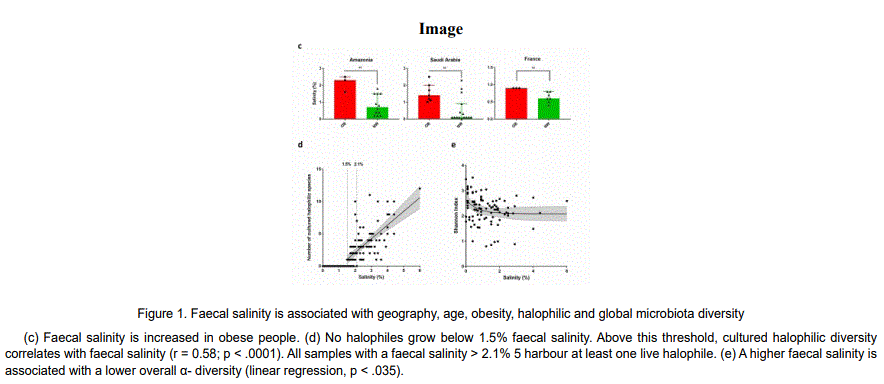2nd International Probiotics, Nutrition & Microbiome Conference
October 10-11, 2018 Amsterdam, Netherlands
Salt in Stools is Associated with Obesity, Gut Halophilic Microbiota and Akkermansia Muciniphila Depletion in Humans
Aix-Marseille University, France
High salt intake has been linked to several diseases including obesity and an increased risk of death; however, fecal salinity and the ability of salt to alter the gut microbiota, which was recently identified as an instrumental factor for health and disease, remains poorly explored.
We analyzed fecal samples of 1,326 human individuals for salinity and gut microbiota by culturomics and metagenomics. Geographical origin, age, gender and obesity were tested as predictors of fecal salinity and halophilic diversity. All halophilic isolates were characterized by taxonogenomics and their genome sequenced.
Fecal salinity was associated with obesity independently of geographical origin, gender and age. The first 2 human-associated halophilic archaeal members were isolated along with 64 distinct halophilic species, including 21 new species and 41 known in the environment but not in humans. No halophiles grow in less than 1.5% salinity. Above this threshold, the richness of the halophilic microbiota was correlated with faecal salinity (r = 0.58, p < .0001). Metagenomics linked high faecal salinity to decreased diversity (linear regression, p < .035) and a depletion in anti-obesity Akkermansia muciniphila and Bifidobacterium, specifically B. longum and B. adolescentis. Genomics analysis suggested that halophilic microbes are not only transient passengers but may be residents of the human gut.
High salt levels strongly alter the gut microbial ecosystem and are associated with the human halophilic microbiota, discovered in this study. Further studies should clarify if the gut microbiota alterations associated with high salt levels and the human halophilic microbiota could be causally related to human disease, such as stomach cancer and obesity.

Biography:
El hadji SECK have recently completed his PhD degree in microbiology specializing in infectious diseases at Aix-Marseille University, France. He is very much interested in the field of gut microbiome research and antibiotic resistance. He has a dual competence as a pharmacist and microbiologist. He worked mainly in the exploration of the gut microbiota by culture and metagonomics and the implication of the digestive microbiota in metabolic diseases such as diabetes and in infectious diseases.



